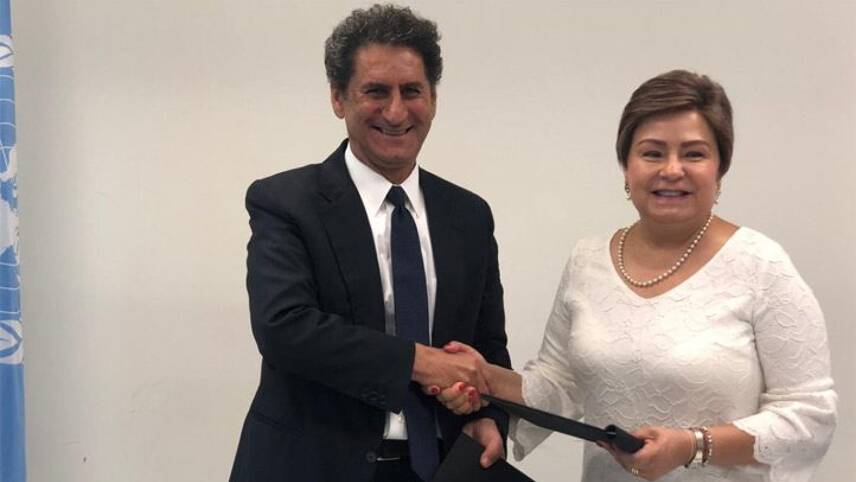Register for free and continue reading
Join our growing army of changemakers and get unlimited access to our premium content

(L) IRENA's director-general Francesco La Camera and (R) UNFCCC executive secretary Patricia Espinosa. Image: IRENA
Under the partnership, which was forged through the signing of a memorandum of understanding in Bonn late last week, the two bodies will exchange information on creating a global energy transition that is both in-line with the urgency of climate challenges and “just” for all sections of society, without exacerbating other key social and environmental issues.
IRENA and the UN Framework Convention on Climate Change (UNFCCC) will also collaborate more closely at expert meetings – including this year’s COP25 and next year’s COP26 – and undertake joint outreach activities aimed at increasing global renewable generation capacity. Such activities will be targeted at expanding regional generation and distribution networks.
The two bodies are already working together on joint publications to showcase the benefits of clean energy but believe the new memorandum of understanding will bolster their collaboration and collective influence.
“The rapid transition to clean energy is crucial to meet the central goal of the Paris Climate Change Agreement, which is to hold the global average temperature rise to as close as possible to 1.5C,” UNFCCC executive secretary Patricia Espinosa said.
“Time is running out. We are already seeing worsening climate change impacts around the world – including unprecedented heatwaves – and we need to grasp all opportunities to rapidly deploy clean, renewable energy at scale to prevent the worst climate scenarios form becoming a reality.”
Energy outlook
According to IRENA’s recent report on achieving a global net-zero power sector – in line with the Intergovernmental Panel on Climate Change’s recommendations for limiting the global temperature increase to 1.5C – 86% of humanity’s power demand could be met with clean energy by mid-century.
The report concludes that this transition will only be realised if policymakers, businesses and investors across the world collaborate to scale-up renewable energy and to electrify sectors such as transport and heavy industry.
Unfortunately, this does not seem to have been the case so far. The most recent report on global progress towards Sustainable Development Goal (SDG) 7: Affordable and Clean Energy for All concluded world is not on track to meet 2030 goals on low-carbon cooking fuels, transport and heat, despite impressive progress in expanding access to electricity in the least developed countries.
Sarah George


Please login or Register to leave a comment.